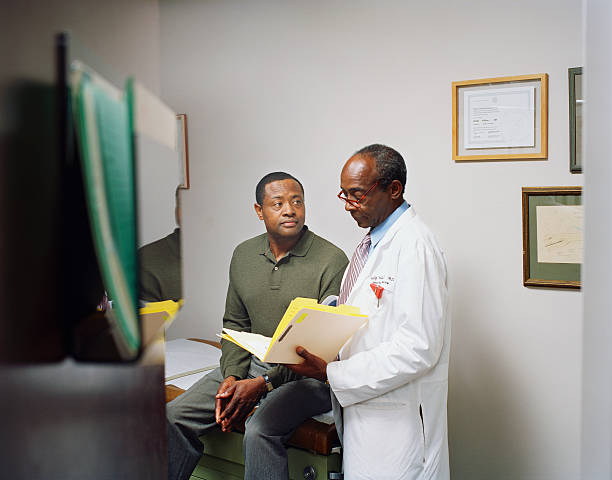
New research has suggested that many Black men may not visit their doctor or partake in a health screening because they find the interaction stressful and don't feel physicians give them enough useful information on how to make recommended lifestyle changes.
The findings from a recent study stem from a series of focus groups with Black men regarding their physicians. The results show doctors are coming up short when it comes to advising patients on how to make healthy changes in behavior -- such as eating better, exercising more or weight loss -- without sacrificing time with family.
When Black men do go to the doctor, it's usually because they have to get test results, or because a family member forced them to pay a visit, research shows. Even then, the men reported not liking the tone that doctors take with them.
With those interesting findings, it’s hard to ignore the fact that our Black men need to take their health (specifically, screenings) seriously.
RELATED: Five Ways I Got Over Hating Going to the Doctor
Here’s a guide that can help:
Health Screening Checklist
Take this checklist to your next doctor’s appointment. Your doctor can help you develop a more tailored screening plan if needed.
These exams are for men at average risk of cancer. If you believe you may be more likely to develop cancer because of your personal or family medical history, speak with your doctor about early screening methods.
Ages 40-49
Beginning at age 40, you should speak with your doctor about the benefits and limitations of prostate screening.
If you choose to screen for prostate cancer, you should get a digital rectal exam and PSA test every year starting at age 45 to check for prostate cancer if you are Black or have a family member that had prostate cancer before the age of 65 (father, brother, son).
The average age for colorectal cancer screening begins at age 45. However, those at a higher risk, such as Black men and men with a family history of colorectal cancer should discuss whether they should start screening earlier with their doctor. A colonoscopy is recommended every 10 years while a virtual colonoscopy should be done every 5 years to check for colorectal cancer.
Ages 50-75
If you choose to get a prostate cancer screening, you should get a digital rectal exam and PSA test every year to check for prostate cancer.
Age 76 and older
If you’re aged 76 to 85, your doctor can help you decide if you should continue screening. MD Anderson does not recommend cancer screening for men aged 85 and older.
RELATED: Legacy Building: 5 Self-Care Tips For Men
All Ages
Testicular cancers can occur between the ages of 15 and 45. Therefore all men should examine their testicles regularly to gain familiarity with their normal look and feel. If at any point you notice changes, they should be reported to your healthcare provider for further testing.
Speak with your doctor about cancer screening exams for lung and skin cancers. Exams are available for those at increased risk.
Lung cancer screenings aren't typically recommended for men that have an average risk.
However, those who are at high risk due to cigarette smoking might consider screening if they meet the following:
- 50 to 80 years of age and in fairly good health.
- Currently smoke or have quit within the past 15 years.
- Have at least a 20-pack-year smoking history (A pack-year is the number of cigarette packs smoked each day multiplied by the number of years a person has smoked. Someone who smoked a pack of cigarettes per day for 20 years has a 20-pack-year smoking history, as does someone who smoked 2 packs a day for 10 years).
- Have gone through smoking cessation counseling if they are current smokers.
Screening is done with a yearly low-dose CT scan (LDCT) of the chest. If you fit the list above, consult with your provider about whether you should start screening.
Although Black men are less likely to develop skin cancer, dark-skinned people can develop skin cancers, most often in areas that are not exposed to the sun (on the soles of the feet, under nails, and genitals), so it is best to protect yourself and take measures to detect skin cancer early. Check out this guide from the American Academy of Dermatology Association for tips on how to perform a skin self-exam.
Regardless of your age, practice awareness. This means you should be familiar with your body so you’ll notice changes and report them to your doctor without delay.

Jasmine Browley holds an MA in journalism from Columbia College Chicago, and has contributed to Ebony, Jet and MADE Magazine among others. So, she knows some stuff. Follow her digital journey @JasmineBrowley.








